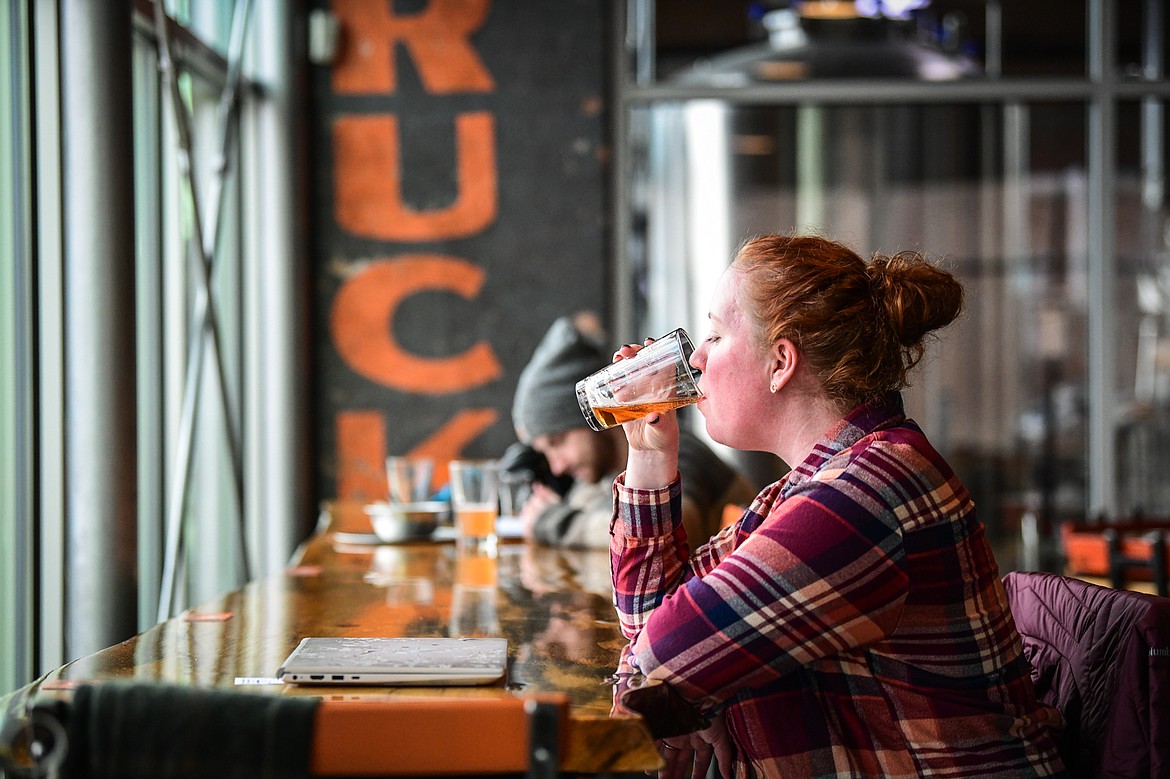Sprunger tackles liquor license system in hopes of fostering entrepreneurship
Flathead lawmakers have introduced a raft of alcohol-related bills during the Legislative Session, but a recent addition to the mix is already generating a buzz.
Just last week, Rep. Courtenay Sprunger, R-Kalispell, introduced House Bill 849, which would let businesses lease a liquor license rather than purchase one outright. Sprunger calls it the floating liquor license lease bill.
Sprunger said the demand for restaurants and entertainment in Kalispell underscores the need for the legislation, which has its first hearing in the House Business and Labor Committee on Monday.
“In our community, our county is growing so much faster than our urban centers and those urban centers are pressured to provide everyone with services,” Sprunger said, referencing the difficulty associated with landing a table in an eatery much of the year in the Flathead.
Her legislation would let businesses pay a fee to effectively rent a liquor license from the county without going through the steps to purchase it, a hurdle that “slows and impedes economic development,” Sprunger said.
The bill would apply to cities and towns that have grown by more than 5% between 2016 and 2021 and has an overlapping quota boundary. No more than six county all-beverages licenses may be utilized and they will be awarded through a bid system.
The license can not be sold or transferred, according to the Kalispell lawmaker.
Sprunger argued the move will help aspiring entrepreneurs since Montana has a limited number of liquor licenses as it is.
“The intention is to create common places of community like restaurants,” she said. “It’s beautiful because it's crafted for Kalispell.”
SOME WORRY that, despite the licenses being non transferable, the legislation would still hurt businesses that have purchased liquor licenses.
“This fundamentally upsets the rules of the game and the rules everyone is playing by,” said John Iverson, the government affairs director of the Montana Tavern Association.
Iverson said that the quota system that exists is already based on population and that their data doesn’t support the assertion that more liquor licenses are needed in the Flathead Valley.
The legislation, on the other hand, has garnered a lot of support from Flathead business owners.
Lorraine Clarno, the president of the Kalispell Chamber of Commerce, said that they are offering their full support for HB 849, as it will help create a vibrant 18 hour downtown core.
The current quota system, according to Clarno, is based on resident population, which does not work for communities like Kalispell, which serves as a regional trade center with a high tourism market.
“We believe this bill will be a strong benefit to our city,” Clarno said.
Gabe Mariman, owner of Kalispell’s Bias Brewing, said the existing quota system is not working because the per capita liquor license system doesn’t account for county growth or tourism.
“You can see the optics of Kalispell. There is not much going on,” Mariman said. “There aren’t enough places to eat and drink. We could all benefit from more available licenses.”
Mariman, a board member for the Kalispell Downtown Association and the Kalispell Business Improvement District, indicated that many other restauranteurs in the area support the legislation.
The brewery owner argued the change will not devalue existing liquor licenses, but rather increase their value. These licenses will increase property value and assist with economic growth for other surrounding businesses. The license can not be taken elsewhere; it belongs to the county.
“This isn't turning the entire system on its head. It's merely awarding licenses to counties with more growth,” Mariman said.
OTHER LEGISLATORS from the Flathead are also shepherding alcohol-related legislation through the statehouse. Rep. Tony Brockman, R-Kalispell, currently has four bills in the Legislature dealing with alcohol; two of which Gov. Greg Gianforte has already signed into law.
The first, House Bill 48, allows licensed distilleries and wineries the opportunity to apply for and operate additional building space for storage. According to Brockman, breweries in Montana already enjoy this right.
“It creates parity among all three alcohol manufacturing types that we have in the state,” Brockman said. HB 48 was signed into law by Gianforte on March 16, along with House Bill 50.
HB 50 is a clean up bill, according to Brockman. The intent is to fix legislation from 2021 that allowed for certain alcohol licensees to offer curbside pickup of alcoholic drinks, a practice that became popular during the pandemic.
House Bill 49, also sponsored by Brockman, is awaiting the governor’s signature. It is also a clean up bill, the representative said. Current law requires agreements between beer wholesalers and importers to be submitted to the Department of Revenue but doesn’t stipulate who needs to file the agreement.
The legislation clarifies that the beer wholesaler is responsible for getting that paperwork to the department, Brockman said.
Lastly, Brockman introduced House Bill 578, which is currently pending in the Senate after passing through the House. The bill allows for packaged alcohol products to be sold for off site consumption at industry events up to six times a year. Distillers and other businesses can apply for a permit and sell their products while attending industry events.
Other legislators are also juggling alcohol legislation. Rep. Braxton Mitchell, R-Columbia Falls, is the sponsor of House Bill 455, which looks to legalize the retail sale of premade Jell-O shots in the state.
Rep. Terry Falk, R-Kalispell, has seen two alcohol bills signed into law. House Bill 69 looks to generally revise laws related to agency liquor stores and House Bill 70 revises laws pertaining to the renewal of liquor licenses.
Reporter Kate Heston can be reached at kheston@dailyinterlake.com or 758-4459.






